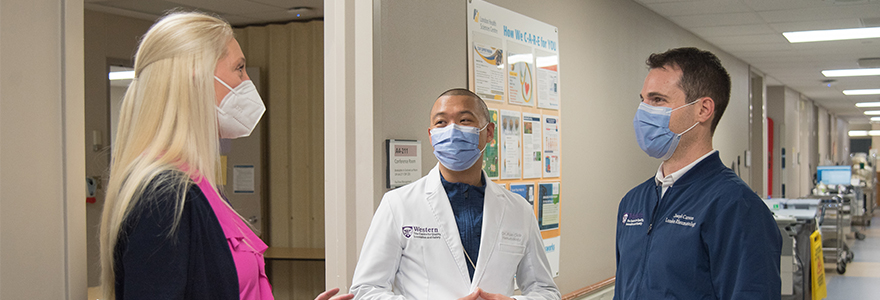Dr. Alan Gob recognized for innovative quality improvement curriculum delivery

(From left) Joan Binnendyk, Dr. Alan Gob and Joe Carson. Photo: Rena Panchyshyn
By Jacob Dearlove
Dr. Alan Gob’s passion for quality improvement (QI) is rooted in his own journey of self-improvement.
“I’m a bit disorganized and absent-minded by nature, so I need to create systems for myself to function effectively,” said Gob, a hematologist at London Health Sciences Centre (LHSC) and the clinical and education lead at the Centre for Quality, Innovation and Safety (CQUINS) – a partnership between Schulich School of Medicine & Dentistry, LHSC, and St. Joseph’s Health Care London. “That really overlapped well with the concepts of quality improvement and setting up systems that are effective and safe. It was a natural fit for me to pursue quality improvement as a career.”
Gob has channeled that enthusiasm into developing innovative methods of curriculum delivery that are changing the way QI principles are taught.
Typically, to teach quality improvement methods to a group of people, a large amount of human and technology resources is required, including teams of specialized quality improvement experts to act as coaches. Recognizing a gap between this ideal and the constraints of real-world resources, Gob set out to establish a teaching curriculum that would allow quality improvement programming to be taught at scale with minimal resources.
“What we’ve done is leverage a lot of technology tools and relationships in order to deliver a curriculum with only two coaches and one educational expert that would normally take a team of people,” said Gob. “We’ve leveraged those things to be able to deliver the same quality of curriculum in a much less resource-intensive way.”
Innovations that work
Along with CQUINS co-authors Joan Binnendyk, education curriculum specialist, and Joe Carson, QI consultant, Gob presented the results of two cycles’ worth of teaching at the 2022 International Conference on Residency Education (ICRE). In recognition of their work, Gob and his co-authors were awarded with the Top ‘What Works?’ Presentation by the Royal College of Physicians and Surgeons of Canada.
“It’s a very fulfilling experience,” reflected Gob. “I love that it recognized the team. This program would not be where it is today without the contributions of Joan and Joe.”
The primary changes to the curriculum were rooted in content delivery via bite-sized online video ‘micro-lectures’ that each corresponded to a key concept in the quality improvement process. Because content delivery was offloaded, the teachers of the course were able to focus on coaching – a development that allowed students to learn practical application of the techniques more quickly.
The team also engaged ‘faculty champions’ in each department to address another key deficiency in normal QI program delivery, a lack of sustained engagement. By installing faculty champions and program administrators within the departments the students were working in, group projects were incorporated directly into the department’s operations.
Proven outcomes
Resident QI programs are normally focused on teaching the principles of quality improvement, but rarely produce concrete changes to clinical process. However, in just two years of teaching under the new format, Gob and his colleagues have already seen five projects result in substantial change to clinical processes.
One such change allowed the endocrinology team to reduce the number of days following surgery that liver and kidney transplant patients spent with high blood sugars. The team accomplished this by engaging the full group of care providers on the unit.
“Seeing the ‘light bulb moment’ with students is the most amazing feeling ever,” said Gob. “To see someone’s perspective change and grow is immensely gratifying; it’s the reason I do this. Anytime we can expand a person’s perspective, we strengthen the culture of quality improvement across the organization.”
Jacob Dearlove is a communications consultant with London Health Sciences Centre.








